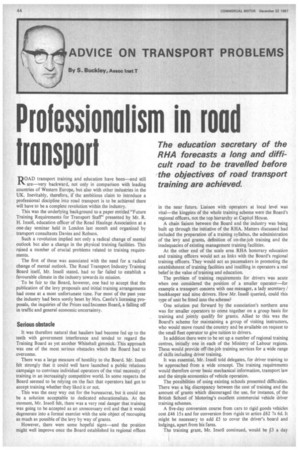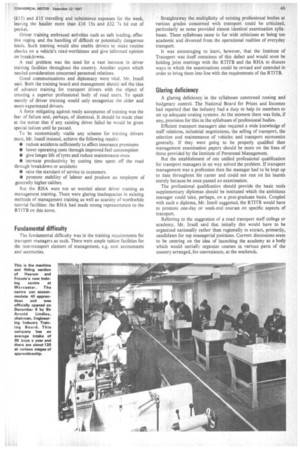Professionalism in rood transport
Page 46

Page 47

If you've noticed an error in this article please click here to report it so we can fix it.
The education secretary of the RHA forecasts a long and difficult road to be travelled before the objectives of road transport training are achieved.
OAD transport training and education have been—and still are—very backward, not only in comparison with leading countries of Western Europe, but also with other industries in the UK. Inevitably, therefore, if the ambitious claim to introduce a professional discipline into road transport is to be achieved there will have to be a complete revolution within the industry.
This was the underlying background to.a paper entitled "Future Training Requirements for Transport Staff" presented by Mr. R. H. Insoll, education officer of the Road Haulage Association at a one-day seminar held in London last month and organized by transport consultants Davies and Robson.
Such a revolution implied not only a radical change of mental outlook but also a change in the physical training facilities. This raised a number of crucial problems related to training requirements.
The first of these was associated with the need for a radical change of mental outlook. The Road Transport Industry Training Board itself, Mr. Insoll stated, had so far failed to establish a favourable climate in the industry towards its mission.
To be fair to the Board, however, one had to accept that the publication of the levy proposals and initial training arrangements had come at a most unfortunate time. For most of the past year the industry had been sorely beset by Mrs. Castle's licensing proposals, the inquiries of the Prices and Incomes Board, a falling off in traffic and general economic uncertainty.
Serious obstacle It was therefore natural that hauliers had become fed up to the teeth with government interference and tended to regard the Training Board as yet another Whitehall gimmick. This approach was one of the most serious obstacles which the Board had to overcome.
There was a large measure of hostility to the Board. Mr. Insoll felt strongly that it could well have launched a public relations campaign to convince individual operators of the vital necessity of training in an increasingly competitive world. In some respects the Board seemed to be relying on the fact that operators had got to accept training whether they liked it or not.
This was the easy way out for the bureaucrat, but it could not be a solution acceptable to dedicated educationalists. At the moment, Mr. Insoll felt, there was a very real danger that training was going to be accepted as an unnecessary evil and that it would degenerate into a formal exercise with the sole object of recouping as much as possible of the levy by way of grants.
However, there were some hopeful signs—and the position might well improve once the Board established its regional offices in the near future. Liaison with operators at local level was vital—the kingpins of the whole training scheme were the Board's regional officers, not the top hierarchy at Capitol House.
A chain liaison between the Board and the industry was being built up through the initiative of the RHA. Matters discussed had included the preparation of a training syllabus, the administration of the levy and grants, definition of on-the-job training and the inadequacies of existing management training facilities.
At the other end of the scale area RHA honorary education and training officers would act as links with the Board's regional training officers. They would act as pacemakers in promoting the establishment of training facilities and instilling in operators a real belief in the value of training and education.
The problem of training requirements for drivers was acute when one considered the position of a smaller operator—for example a transport concern with one manager, a lady secretary! bookkeeper and nine drivers. How Mr. Insoll queried, could this type of unit be fitted into the scheme?
One solution put forward by the association's northern area was for smaller operators to come together on a group basis for training and jointly qualify for grants. Allied to this was the Board's scheme for maintaining a group of visiting instructors, who would move round the country and be available on request to the small fleet operator to give tuition to drivers.
In addition there were to be set up a number of regional training centres, initially one in each of the Ministry of Labour regions. These would provide off-the-job training services for a wide range of skills including driver training.
It was essential, Mr. Insoll told delegates, for driver training to be approached from a wide concept. The training requirements• would therefore cover basic mechanical information, transport law and the simple economics of vehicle operation.
The possibilities of using existing schools presented difficulties. There was a big discrepancy between the cost of training and the amount of grants which discouraged the use, for instance, of the British School of Motoring's excellent commercial vehicle driver training schemes.
A five-day conversion course from cars to rigid goods vehicles cost £46 15s and for conversion from rigids to artics £62 7s 6d. It might be necessary to add £5 to cover the driver's board and lodgings, apart from his fares.
The training grant, Mr. Insoll continued, would be £3 a day (£15) and £15 travelling and subsistence expenses for the week, leaving the haulier more than £16 15s and £32 7s 6c1 out of pocket.
Driver training embraced activities such as safe loading, effective roping and the handling of difficult or potentially dangerous loads. Such training would also enable drivers to make routine checks on a vehicle's road-worthiness and give informed opinion on breakdowns.
A real problem was the need for a vast increase in driver training facilities throughout the country. Another aspect which needed consideration concerned personnel relations.
Good communications and diplomacy were vital, Mr. Insoll said. Both the training board and management should sell the idea of advance training for transport drivers with the object of creating a superior professional body of road users. To speak merely of driver training would only antagonize the older and more experienced drivers.
A force mitigating against ready acceptance of training was the fear of failure and, perhaps, of dismissal. It should be made clear at the outset that if any existing driver failed he would be given special tuition until he passed.
To be economically viable any scheme for training drivers must, Mr. Insoll insisted, achieve the following results: a reduce accidents sufficiently to affect insurance premiums • lower operating costs through improved fuel consumption • give longer life of tyres and reduce maintenance costs • increase productivity by cutting time spent off the road through breakdown or accidents • raise the standard of service to customers • promote stability of labour and produce an employee of generally higher calibre.
But the RHA were not so worried about driver training as management training. There were glaring inadequacies in existing methods of management training as well as scarcity of worthwhile tutorial facilities: the RHA had made strong representation to the RI-ITS on this Score.
Fundamental difficulty
The fundamental difficulty was in the training requirements for transport managers as such. There were ample tuition facilities for the non-transport element of management, e.g. cost accountants and secretaries. Straightaway the multiplicity of existing professional bodies at various grades concerned with transport could be criticized, particularly as some provided almost identical examination syllabuses. These syllabuses came in for wide criticisms as being too academic and divorced from the operational realities of everyday transport.
It was encouraging to learn, however, that the Institute of Transport was itself conscious of this defect and would soon be holding joint meetings with the RTITB and the RHA to discuss ways in which the examinations could be revised and extended in order to bring them into line with the requirements of the RTITB.
Glaring deficiency
A glaring deficiency in the syllabuses concerned costing and budgetary control. The National Board for Prices and Incomes had reported that the industry had a duty to help its members to set up adequate costing systems. At the moment there was little, if any, provision for this in the syllabuses of professional bodies.
Efficient transport managers also required a wide knowledge of staff relations, industrial negotiations, the selling of transport, the selection and maintenance of vehicles and transport economics generally. If they were going to be properly qualified then management examination papers should be more on the lines of those provided by the Institute of Personnel Management.
But the establishment of one unified professional qualification for transport managers in no way solved the problem. If transport management was a profession then the manager had to be kept up to date throughout his career and could not rest on his laurels merely because he once passed an examination.
The professional qualification should provide the basic tools supplementary diplomas should be instituted which the ambitious manager could take, perhaps, on a post-graduate basis. Coupled with such a diploma, Mr. Insoll suggested, the RTITB would have to promote one-day or week-end courses on specific aspects of transport.
Referring to the suggestion of a road transport staff college or academy, Mr. Insoll said that initially this would have to be organized nationally rather than regionally to attract, primarily, candidates for top managerial positions. Current discussions seem to be centring on the idea of launching the academy as a body which would initially organize courses in various parts of the country arranged, for convenience, at the weekends.




















































































